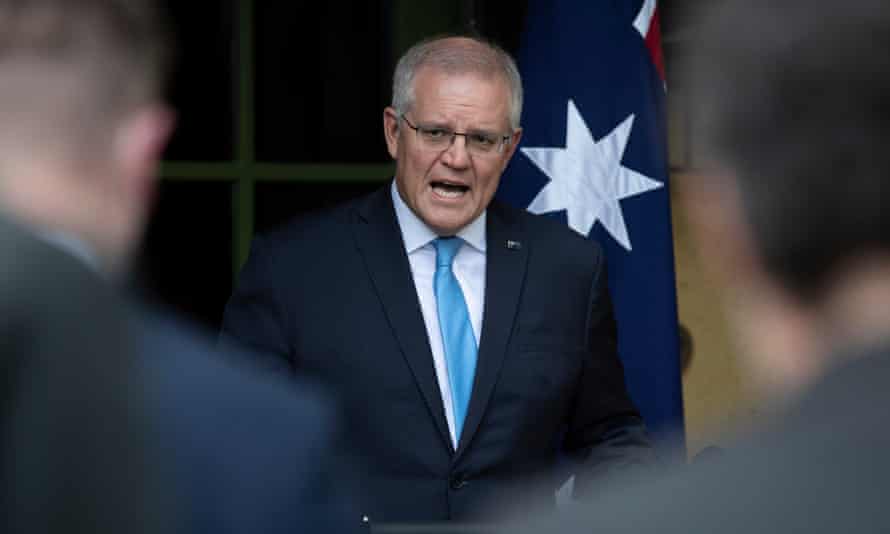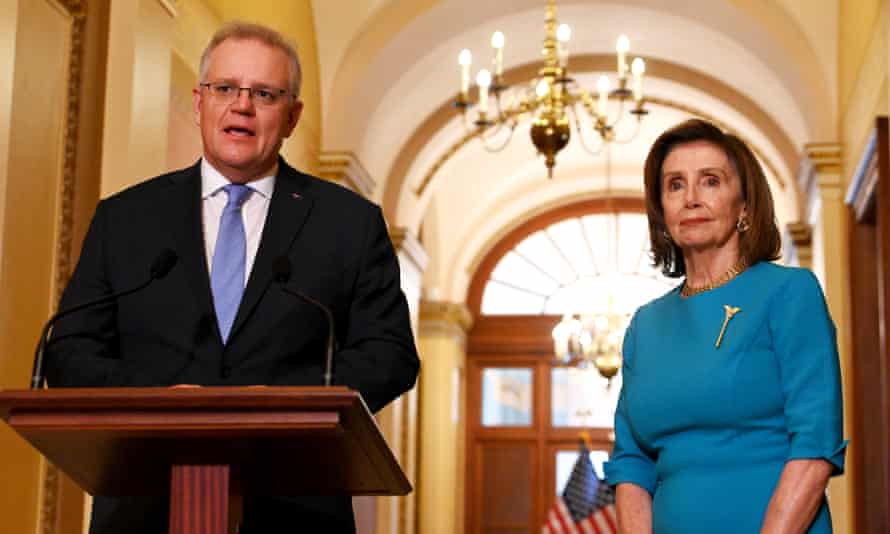Extract from The Guardian
The PM’s spin was in full flight in Washington DC. Unless he can commit to real climate action, whatever he does at Cop26 would be more empty announcements

It depends. In my view, he should only go to the Cop26 conference if he plans on making a decent contribution to increasing global climate action. And whether he would do that remains highly questionable.
One of the biggest shocks I’ve had recently was hearing US Speaker of the House Nancy Pelosi congratulating Scott Morrison on his “climate leadership”. I nearly fell off my chair.
The master of spin had somehow gone to Washington and conned one of America’s most important political figures, receiving accolades he didn’t deserve. He ran his government’s usual “meet and beat” line about the current Australian 2030 target, a claim that is fallacious and wrong, and not supported by its own projections.
He presented it as a fact to Pelosi and to gullible foreign correspondents. The same could easily happen in Glasgow.

Scott Morrison with US Speaker of the House Nancy Pelosi at the US Capitol on 22 September. Photograph: China News Service/Getty Images
In reality, Australia is one of the world’s laggards on climate change. Analysis after analysis has compared Australia’s performance on climate with other countries and all come up with the same view.
The Climate Action Tracker’s latest analysis downgraded Australia’s overall rating to “highly insufficient” and shows the country isn’t on track to meet its 2030 target, which is itself insufficient. If all others followed this level of ambition we would warm the planet by 3C. The same analysis was repeated by a recent Climate Analytics/WRI G20 report, and others have made similar criticisms, including the UN secretary general’s office.
Scott Morrison himself has publicly questioned whether it is worth his while going to Cop26 climate change conference in Glasgow. He has been rightfully criticised for this uncertainty, given the fundamental importance of the Glasgow meeting for climate action globally, and the conjunction between the Glasgow meeting and the G20 leaders’ meeting in Italy the weekend before. Many of our partners have attached strategic importance to this meeting, notably the United States, the UK, the European Union, India, our Pacific island neighbours and many others.
While it would be unusual
for Morrison to miss out on being in the big G20 leaders’ photo call, he
might want to avoid the G20 altogether, given that the French
president, Emmanuel Macron, will be there – and who doesn’t want to be a
fly on the wall for THAT conversation?
If he’s planning to go to continue the spin seen in Washington DC and make empty announcements, he should stay at home.
There
are a set of conditions I think any Australian leader should meet
before attending the Cop26 climate summit in Glasgow next month.
First,
a suitably enhanced 2030 target (or “nationally determined
contribution”) well north of a 50% reduction in emissions (below 2010
levels). A fully 1.5C compatible domestic pathway for Australia would be
at least 65% reduction by 2030. Morrison should not sidestep and dodge
this by talking about 2035.
Second, a firm commitment to
substantially increase financial contributions to climate action
globally. Australia is one of the laggards in this area – the Climate
Action Tracker gave it a “critically insufficient” rating on this issue.
Australia needs to stop funding fossil fuels overseas and increase the
level of its international climate finance.
Third,
take off the table, unambiguously, without conditions and once and for
all, Australia’s long-held position on using “carryover” credits for
meeting its Paris agreement obligations. Because to meet your 2030
target using carbon credits substantially derived from historically high
deforestation levels 40 years ago would be the ultimate con job. And
while he has announced he might not do this, there is wiggle room in the
government’s target submitted to the United Nations framework
convention on climate change.
Fourth, Australia needs to support
the highest possible level of environmental and accounting integrity in
the Paris agreement rulebook, which is still not finalised and in which
Australia had appalling positions in Madrid in 2019.
Fifth, Australia needs to join with many other countries that are moving to phase out coal from the power sector early. The UK Powering Past Coal Alliance
now has 41 state members, and the UN secretary general has called on
countries to phase out thermal coal by 2030, consistent with the
science. Coal phaseout will also be on the G20 agenda.
Finally, Australia should join with many other countries in committing unambiguously to reach net zero emissions nationally by 2050 at the latest.
This may sound like a lot, but it’s actually exactly what many of our peers have done. This position would put Australia at parity with the UK, the EU, the US and others. That’s all. It would not particularly establish Australia as a leader but one that has simply just caught up with what its counterparts are doing as the world responds to the growing climate crisis.
Unless Morrison does these things,
then whatever he does in Glasgow would simply be more empty
announcements, which he is becoming famous for. Because, on the ground
in Australia the federal government has virtually no policies on
anything that would reduce greenhouse gas emissions; if anything it’s
the opposite.
The Morrison government’s gas-led recovery is
pouring tens of millions into enabling more gas resource development
when we don’t need it – a move that will only make meeting Paris
compatible targets harder.
He is focusing on subsidising carbon capture and storage (CCS) technology that has a well-established track record for not working, increasing rather than decreasing costs, and deploying this in the next decade to expand the production of oil.
His government continues to support coal and developing new coalmines. With the Adani coalmine heading towards its first shipment of coal by the end of the year, possibly around the Glasgow timeframe, how great will that look?
Morrison’s government continues to promote policies that would keep coal in the power system and that would create blockages to solar energy, dubbed “coalkeeper” and “solar stopper”, respectively. Fortunately, the states are jacking up against this, but that has not stopped him.
He
has no policies to accelerate the rollout of electric vehicles, and his
government appears antagonistic to this technology. Australia is alone
in the developed world for not having motor vehicle CO2 efficiency
standards, and our fleet efficiency is going backwards.
Morrison
does not support green hydrogen, instead he is focusing on so-called
“clean hydrogen” – hydrogen made with fossil gas, deploying carbon
capture and storage which goes under the marketing name of “blue
hydrogen”. Blue of course is a marketing colour that is designed to have
a soft appeal to consumers, but there is nothing soft or nice about
blue hydrogen. And it will not reduce emissions.
So should Scott Morrison go to Glasgow? Sure, but only if he does his homework.
No comments:
Post a Comment